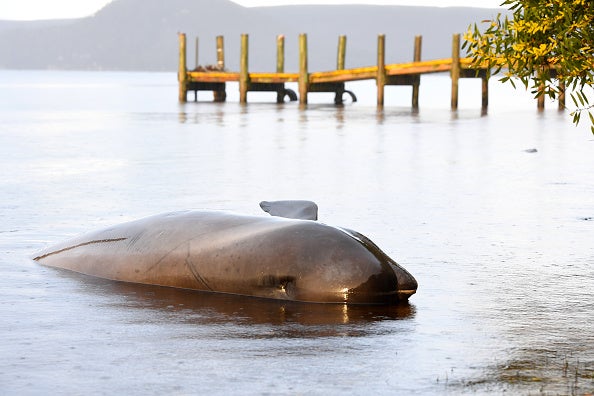Race to save whales from biggest mass stranding in Sri Lanka's history
About 120 pilot whales involved in mass beaching, with at least two found dead so far

The navy and volunteers in Sri Lanka fought to rescue more than 100 pilot whales after they became stranded overnight in what is believed to be the country’s largest ever mass beaching.
According to officials at least two of the mammals were found dead, as sailors and locals worked through the night into Tuesday morning using small boats to drag the whales back out to see.
We used our small inshore patrol craft to pull the whales one by one back into deeper waters," navy spokesperson Indika de Silva told the AFP news agency. "Sadly, two whales have died of the injuries sustained when they beached."
The school of short-finned pilot whales began coming ashore at Panadura, 25km south of the country’s capital, Colombo, shortly before dusk. Within hours, the number swelled to a peak of about 100, a local police chief Sanjaya Irasinghe said. In all, around 120 whales are believed to have been rescued.
The beaching of pilot whales is a phenomenon observed across the world. In September, about 470 pilot whales were stranded on the Australian island state of Tasmania, and only around 100 survived despite a five-day long rescue operation.
Though there are several theories explaining why pilot whales are especially susceptible to mass beachings, the exact cause of the phenomenon remains a mystery.
Some experts say the animals can become disoriented after following fish they hunt to the shore. Others theorise that the fact pilot whales live in large schools means one individual can mistakenly lead whole groups to beach.
Researchers also believe that such groups are susceptible around beaches which gently slope across a wide area, because the whales' sonar can fail to detect the shoreline in shallow waters.
Subscribe to Independent Premium to bookmark this article
Want to bookmark your favourite articles and stories to read or reference later? Start your Independent Premium subscription today.

Join our commenting forum
Join thought-provoking conversations, follow other Independent readers and see their replies